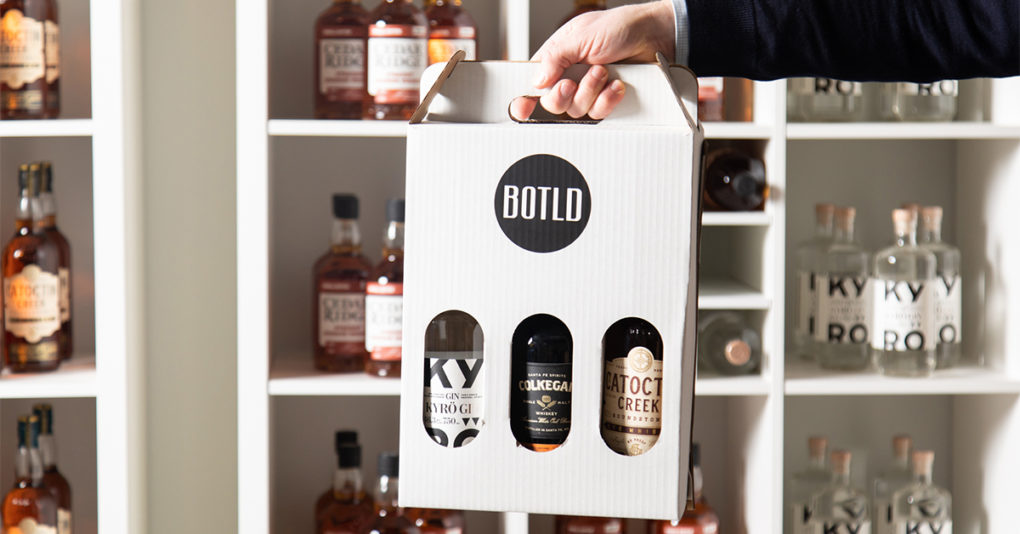
But BOTLD, a recent retail venture from one of Pennsylvania’s most well known distillers, has found a workaround to sell rums, bourbons and other spirits that otherwise may never make it into one of the country’s most populous states.
Since the end of Prohibition, liquor sales in Pennsylvania have fallen under the Pennsylvania Liquor Control Board (PLCB), which means there are 600 state-controlled liquor stores but with less out-of-state small or craft brands than typically found in open states. Smaller distilleries typically lack the resources to navigate the control system which has a strict licensing process and requires distilleries to demonstrate demand in the market before the state board will consider approving the product. Restaurants and bars face a labyrinth of regulations to secure a liquor license too, and many go without.
For many Pennsylvanians, shopping for independent or craft brands means a trip to neighboring New Jersey or Delaware, leading to a loss of state sales referred to as the “border bleed.”
“When we travel to say, California you see tons of new brands and different volume sizes, and a plethora of new, small-batch, craft and global spirits, but this state very much has— to use a pun— a bottleneck,” said Andrew Auwerda, founder of BOTLD.
As the founder of Philadelphia Distilling, the state’s first craft distillery since prohibition, Auwerda is more familiar than most with Pennsylvania’s liquor laws. Launched in 2005 (when there were less than 50 distilleries in the U.S.), Auwerda’s Bluecoat American Dry Gin and its distillery went on to be sold to Heaven Hill in February 2022.
But before that Auwerda helped successfully lobby for the passage of a 2016 law allowing in-state craft distilleries to sell their spirits directly to consumers without any PLCB interference. The exception extends to any craft spirit bottled in the state, the foundation for Auwerda’s new business.
During pandemic closures of state liquor stores and on-premise channels, Auwerda began marketing his spirits directly to consumers and licensees with a three-prong program of local contactless pick-up, citywide delivery and statewide flat fee shipping. The new model resulted in a jump from a few hundred ecommerce dollars per month to $800,000 in its first month. It occurred to Auwerda that he could sell other spirits this way too, but only if they were distilled and bottled at his distillery.
From Monopoly to Marketplace
BOTLD now partners with about 30 craft distilleries from across the country and beyond to source, blend, and bottle their products at a former Post Office distribution and production facility in King of Prussia, Pennsylvania.
The company has essentially flattened the three tiers by buying bulk spirit up front from craft spirit producers through a licensing agreement, transporting totes of liquid to Pennsylvania, doing a small production step, re-bottling and labeling, and then selling direct-to-consumer and to restaurants out of its Philadelphia store.
“We’re launching some of our own proprietary brands, but the core of the company is these awesome connections that we’ve made in allowing Pennsylvania consumers to access these female-led brands, these eco-conscious brands, Black-owned family brands and things that the PLCB would not normally list and the odds of them ever getting in the state are very, very slim,” he said.
The company is still building out each category, but offers craft spirit pioneers like Catoctin Creek and St.George Distillery, as well as Pronghorn-Backed Delta Dirt. When asked about the price difference between a brand working with a wholesaler in another state versus BOTLD, Auwerda guesses distillers make a little less selling to him, but gain a version of a marketing and demo team. As a craft distiller BOTLD can offer tastings at the store of any product, can deliver next day to on-premise accounts, and bring the brands to tasting events outside of the distillery.
After launching in New York and Florida in 2020, one of BOTLD’s craft spirit partners, Eric Zurita, CEO of Pa’Lante Rum, said they were able to reach a new set of unique customers by circumventing the control state.
“For a brand at such an early stage, it has been insightful to learn how our brand resonates in all three markets, as well as what products in our portfolio sell the best,” he said. “In New York and Florida, for example, our White Rum has been the top seller, while in Pennsylvania the Coffee Rum is the lead SKU.”
The craft rum brand has also executed pop-ups in Pittsburgh, a more midwestern part of the state, thanks to the partnership, he said.
In addition to working with other distillers, Auwerda has developed a new portfolio of his own spirits that can respond to fast-tracking categories. That work is being done with WeHolden, a Philadelphia-based spirits ad agency responsible for bringing to market brands like Teremana Tequila, Casa Lumbre’s Nixta and Abasolo and Conor McGregor’s Proper No. 12.
Last month that collaboration produced Bird Gang Spirits, two commemorative bottles in partnership with the Philadelphia Eagles, a series that is expected to continue honoring significant milestones and historical team moments— and be on the menu at the stadium. Other spirits include Pigeon Foot American Straight Whiskies, soon to be distributed in New Jersey too, and mixer tequila Salta Montes.
Auwerda is also focused on streamlining his e-commerce and delivery platform, and building five more retail stores in the state. That web is unlikely to extend to other control states, as most don’t have the same combination of craft distiller laws and a monopoly on retail that’s as big brand-focused. He’s done one fundraising round of family, friends, and other private investors, and doesn’t expect to do more.
“There may be a couple other states, but right now, I’m just focused on trying to make this a sustainable business in Pennsylvania with some scale,” he said.